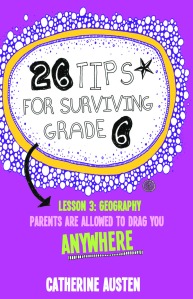Catherine Austen
Creative Writing
26 Tips for Surviving Grade 6
Humourous Advice
“Some people can sell their help for thousands of dollars, Becky thought. I can’t even give mine away.”
Forget social studies, math, and science — this novel is about surviving some of the real problems girls face in the sixth grade: jealous friends, first crushes, embarrassing parents, and annoying older brothers.
Becky Lennox has an opinion on everything to do with tween life, and she shares all she learns with honesty and humour in this middle-grade award-winning comedy.
“26 Tips for Surviving Grade 6 is a simply told yet fast-paced and colourful blend of humour and drama [with] well-rounded, credible characters…. Highly recommended.” – Canadian Materials
 To buy a copy of 26 Tips for Surviving Grade 6:
To buy a copy of 26 Tips for Surviving Grade 6:
- visit your local bookstore (find one at Indie Store Finder);
- buy online from Amazon (Canada), Chapters, Barnes & Noble;, or
- order directly from the publisher, Lorimer.
Winner of the Hackmatack Children’s Choice Book Award (English Fiction) and Winner of the Quebec Writers’ Federation Prize for Children’s and Young Adult Literature.
- Juvenile Fiction (ages 9-13); 128 pages; available in hard cover, paperback, or e-book editions
- Themes: Humour; school stories; girls & women; friendships; jealousy; circuses.
Haven’t Read It?
Read the first chapter of 26 Tips for Surviving Grade 6 right now to see if you like it.
Need more Tips?
Check out Becky’s fun tips for surviving other situations like tornadoes and zombie attacks.




I hear your going to book fest. Sadly I will not be able to go but I am getting a friend to get the book 26 Tips for Surviving Grade 6 for me because I am going in to grade six and very nervous.
from Anna.
Hi Anna. I hope you like the book and I hope you have as much fun in grade 6 as the main character Becky has. Sorry I won’t see you at Bookfest – I am really enjoying my visit to Nanaimo and I can’t wait to see what Bookfest is like. Thanks for stopping by my blog.
Pingback: national public readings – Catherine Austen
Hi,
I hope you can give me really good tips for grade 6,7. I love your books.
Oh my gosh, that is so sweet. Thanks for telling me. 🙂 I hope you have a great schoolyear.
what tips can you give me for writing. I want to be a author but I can never finish any of my stories. Hope you can help me.
Hi Wanda,
Finishing stories is hard for many of us (especially once you start to work on novels!). A regular schedule helps — set aside an hour every Sunday or half an hour twice a week to write stories. If you know other kids who like to write, get together once a week, at school or home, to work on your stories, even just for half an hour, and then hang out after. (I do this with some friends; we call it a WISH for Write in Silence Hour).
If finishing is your goal, try to work on one story until it’s done. Pick one of your ideas and commit to finishing that story this month. Give yourself a deadline. Maybe try to think of an ending and then identify the shortest way to get there — maybe you only need two more scenes — and knuckle down and write it scene by scene. If you can break the work down into four small chunks and schedule one chunk a week, you’ll finish your story this month.
Sometimes the problem with finishing is actually starting — once you start to work on the story, you get into it and keep writing. Sometimes the problem with finishing is doubt, either in your writing ability or your story’s value — just get the draft done without judging its quality. Make your goal finishing a story rather than writing a great story. If you like something about it after it’s drafted, you can rewrite it to make it better.
Sometimes the problem, though, is a lack of ideas about how to continue or end the story. In that case, reread your beginning and see if it suggests an ending, or at least some consequences to what’s already happened. Brainstorm things that could happen, problems your character could face (that get in the way or their goal), emotional changes they could undergo. Use a prompt to dig up some plot — make your character encounter someone they don’t want to see or have them find an object that will help solve a problem. Maybe ask a friend to read your beginning and talk about possible endings. For some people, talking out loud about your story and what could happen in it sparks better ideas because you’re not worried about how to phrase things. But know that you’ll really only discover the story by writing it, so there’s no getting around spending time writing.
Whatever you try, stop telling yourself, “I can never finish any of my stories.” You’ll start to believe that — and it’s just not true! Of course you can finish a story. And finishing doesn’t have to be your goal every time you write — you can just write to see what you come up with, what cool ideas and lovely turns of phrase and interesting characters. Just keep writing. Maybe the next story you start will be the one you’ll want to finish. 🙂